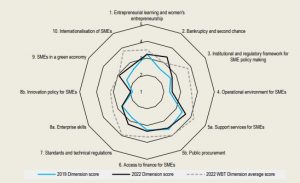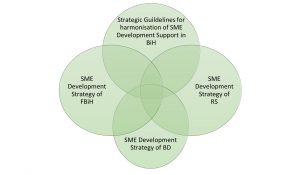The OECD with partners (European Commission, European Bank for Reconstruction and Development and European Training Foundation) published in July 2022 the report “SME Policy Index: Western Balkans and Turkey 2022: Assessment of the implementation of the Small Business Act for Europe, SME Policy Index” . This is the sixth such report, as six rounds of assessment have been conducted in the countries of the Western Balkans and Turkey: 2006, 2009, 2012, 2015, 2018 and 2021. After so much time and so many serious assessments and reports, which are prepared continuously, professionally and systematically, the question logically follows: have we learned and changed something in the approach to this type of evaluation, and what and how can we still improve.
Before attempting to answer those questions, here are a few lines of information about what the SBA is and how the assessment and reporting process works.
What is SBA and how does the assessment and progress reporting process work?
Small Business Act (SBA)[1] as an European framework law on small and medium-sized enterprises was adopted in 2008. It represents a comprehensive framework for the creation, implementation and monitoring of policies targeting small and medium-sized enterprises. The concept is based on the constant improvement of entrepreneurship and the incorporation of the principle of “think small first” into laws and policies that should strengthen the competitiveness of SMEs in the countries of the European Union. It consists of ten principles and a series of additional concrete activities undertaken in order to put these principles into practice. The application of SBA in the countries of the Western Balkans is carried out through the SME Policy Index[2]. It is a tool with which this framework law is operationalized, in order to enable the monitoring and evaluation of the progress of countries that are in the phase of joining the EU, whose economies are in the phase of formation or transformation, in terms of bringing their support closer to the good practices achieved in the EU countries. The Index was jointly developed by the Organization for Economic Co-operation and Development (OECD), the European Commission (EC), the European Bank for Reconstruction and Development (EBRD) and the European Training Foundation (ETF). The assessment is based on the ten SBA principles, which have been converted into the twelve main dimensions of the SME Policy Index. Almost all dimensions are further broken down into a number of sub-dimensions, and each sub-dimension is evaluated from three angles: how a specific policy is designed, how it is implemented, and how its effectiveness is monitored and evaluated.
The evaluation process takes place in two ways: through a self-assessment process by governments and their bodies and, in parallel, through an independent assessment by the OECD and its partner organizations, based on interviews with key actors and the private sector. Twenty-three sub-dimensions and more than a hundred policy indicators are now used. The assessment of the state of the indicators according to this index is carried out on the basis of an extensive questionnaire with hundreds of questions (closed type with binary or multiple choice, and open type at the end of each thematic block[3]). The answers to the questions are then reduced to the corresponding places on a five-point scale for each sub-dimension. The five-point scale indicates different levels of policy development and implementation. Within each dimension, appropriate comments and recommendations for the next period are given along with the ratings.
In the 6th report “SME Policy Index: Western Balkans and Turkey 2022: Evaluation of the implementation of the Small Business Act for Europe, SME Policy Index”[4] general assessment for all included countries (Albania, Bosnia and Herzegovina, Montenegro, Kosovo*, North Macedonia, Serbia and Turkey) is that many of the recommendations made in the 2019 assessment have been implemented, particularly those on addressing financial barriers to SMEs’ greening efforts, increasing support programs to help SMEs implement standards and strengthening innovation activity.
The following table was used to show the basic meaning of each of the 5 grade levels:
| Level 5 | Level 4 plus results of monitoring and evaluations inform policy framework design and implementation. |
| Level 4 | Level 3 plus evidence of a concrete record of effective policy implementation. |
| Level 3 | A solid framework, addressing the policy area concerned. |
| Level 2 | A draft or pilot framework exists, with some signs of government activity to adress the policy area concerned. |
| Level 1 | No framework (e.g. law, institution) exists to address the policy topic concerned. |
The following graph presents the profile of BiH scores for the implementation of the SBA according to the report for 2022, so that progress in dimensions compared to the report from 2019 and lagging behind the average of the countries of the Western Balkans and Turkey is visible.
What is reflected in the new approach in the implementation of SBA in BiH
In Bosnia and Herzegovina, since 2018, a new approach regarding the implementation of SBA is gradually being built and applied. The previous approach was practically reduced only to the reporting phase, which was repeated every three years, under the methodological guidance of the OECD. Since 2018, with the support of the projects “Small Business Act as a framework of strategies and policies for SMEs, SBA in BiH“ (now “Advanced implementation of SBA in BiH2EU”), which is implemented by Eda – Agency for the Enterprise Development, and projects “EUProlocal” (then “Innovation and Digitalisation in SMEs in Bosnia and Herzegovina” and now “EU4DigitalSME”), implemented by GIZ, a new approach is being developed. The teams of the Ministry of Foreign Trade and Economic Relations of Bosnia and Herzegovina – Sector for Economic Development and Entrepreneurship, the Federal Ministry of Development, Entrepreneurship and Crafts, the Ministry of Economy and Entrepreneurship of the RS and the Department for Economic Development, Sports and Culture of the Brčko District of Bosnia and Herzegovina are working together on the construction and implementation of the new approach. Work modalities include meetings of SBA coordinators and joint workshops of institutional teams with support projects.
The new approach seeks to complete the cycle of managing the development of SMEs in accordance with the given European framework, so that:
- in the planning phase, the principles and priorities of SBA implementation are incorporated into the strategic framework for the development of SMEs in BiH, in accordance with the competences of the respective levels of government (BiH, entities, Brčko District of BiH);
- strategic documents are operationalized through three-year action plans and annual work plans of responsible institutional holders;
- the implementation of priorities helps through smaller funds available to projects that provide support;
- organizes systematic monitoring and evaluation of the implementation of the strategic framework for the development of SBA in BiH, at the previously mentioned levels of government and in total;
- reports on the progress in the implementation of the strategic framework for the development of SMEs to domestic institutions, that is, the implementation of the SBA to the OECD (with partners: the European Commission, the European Bank for Reconstruction and Development and the European Training Foundation).
According to this approach, the strategic framework for the development of SMEs in Bosnia and Herzegovina is complex, in accordance with the complex structure of the state, and it consists of the following documents that are externally harmonized with the European framework, as well as with each other:
Work on the construction of such a strategic framework is still ongoing: Strategic Guidelines have been prepared and passed the phase of consultation and coordination with the entities and Brčko District of BiH, SME Development Strategy in Republika Srpska 2021-2027 has been adopted and is currently in the phase of operationalization and implementation, SME Development Strategy in the Federation of BiH 2022-2028 is in the drafting phase, while the SME Development Strategy in the Brčko District of BiH is in the adoption phase.
In mid-July 2022, the teams of the aforementioned institutional partners from the level of BiH, both entities and BD BiH, together with the teams of supporting projects, held a reflection workshop in Teslić, looking back at the 6th report of the OECD and the process of its preparation, with a view forward: what should and can be improved in monitoring and evaluation (M&E) and reporting processes, so that progress in the implementation of SBA at all levels is faster and greater.
More on that in the next blog.
Footnotes:
[1] Communication from the Commission to the Council, the European Parliament, the European Economic and Social Committee and the Committee of the regions: “Think Small First” – A “Small Business Act for Europe”, Brussels (2008) https://eur-lex.europa.eu/legal-content/EN/TXT/PDF/?uri=CELEX:52008DC0394&from=EN
https://eur-lex.europa.eu/legal-content/HR/TXT/?uri=LEGISSUM%3Aet0001
[2] http://www.oecd-ilibrary.org/development/sme-policy-index_24136883
[3] Thematic blocks refer to design, implementation, and monitoring and evaluation of policy implementation.
[4] OECD (2022), SME Policy Index: Western Balkans and Turkey 2022: Assessing the Implementation of the Small Business Act for Europe, SME Policy Index, OECD Publishing, Paris, https://doi.org/10.1787/b47d15f0-en.
* This designation is without prejudice to positions on status, and is in line with United Nations Security Council Resolution 1244/1999 and the Advisory Opinion of the International Court of Justice on Kosovo’s declaration of independence










